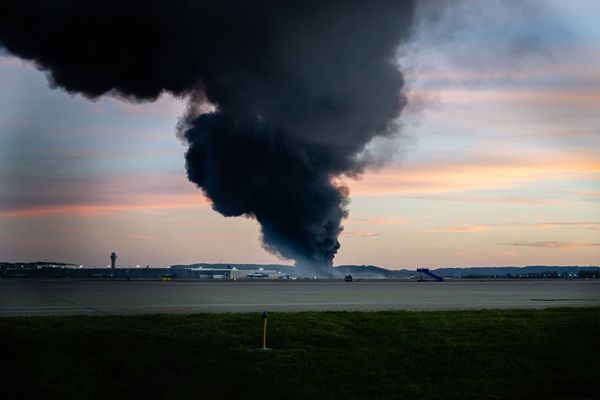
If, as seems increasingly probable, Russia decides not to launch an all-out invasion of Ukraine, tub-thumping US and British politicians who have spent weeks scaring the public with loose talk of looming Armageddon will have some explaining to do.
The military build-up directed by Vladimir Putin, Russia’s president, is real enough. But suspicion grows that the actual as opposed to the hypothetical threat of a large-scale conventional attack is being mis-read, misinterpreted, over-estimated or deliberately exaggerated.
It wouldn’t be the first time.
This view is shared in part by Ukraine’s leader, Volodymyr Zelenskiy, who last week demanded that the US president, Joe Biden, stop suggesting invasion was “imminent”. Wild American talk of war was damaging his country and stoking panic, he said.
Fulminating against “self-fulfilling prophecies”, Emmanuel Macron, France’s president, is also trying to calm the rhetoric. He and Germany’s chancellor, Olaf Scholz, who has refused to join the armchair warriors, may soon meet Putin for talks in Moscow.
Warning lights flashed red in late January when British intelligence officials briefed anonymously that invasion could be “two to three weeks away”. This echoed alarmist US predictions of conflict “at any time”.
A furious war on truth is already under way. Russia claims US mercenaries are active in Ukraine. Dubious allegations of a plot to oust Zelenskiy were floated by Liz Truss’s Foreign Office. Washington says a fake video, not yet seen by anyone, shows a staged attack on Russian forces.
As Britain’s Boris Johnson, keen to show fealty and distract from partygate, warned of a “lightning” strike, Biden talked in messianic terms about a “world-changing” conflict, beginning in February. They may yet be right.
But February has arrived, and still no war. As Biden orders the 82nd Airborne Division to eastern Europe this weekend, Putin is chilling with his “dear friend”, President Xi Jinping, at the winter Olympics in Beijing – not an obvious spot from which to launch a blitzkrieg.
Deploring “western hysteria”, the Kremlin denies any intention to invade. Putin said last week he hoped “dialogue” would succeed – while refusing to pull back his forces. Putin is not a man to be trusted. His reasoning is twisted, his brinkmanship notorious, his instincts brutal. But he does seem to have been given pause by the feverish US response.
He now appears focused on extracting maximum diplomatic advantage, meaning concessions on European security, Nato, and new US medium-range missile deployments, while maintaining military pressure. Putin has also given Kyiv’s “western puppets” a nasty shock. That may have been his game-plan all along.
If this phoney war ends with a whimper, not a bang, Johnson and other mini-Churchills will declare victory, saying they faced down aggression. European leaders will argue that diplomacy was vindicated.
Even so, relieved people across Europe, subjected daily to over-heated predictions of mayhem, will be entitled to ask: what, really, was all that about? Was the intelligence wrong – again?
The answer, in a word, is China.
It’s true Biden strongly backs Nato, which underpins US interests in Europe. It’s true, too, that as a cold war veteran, his instinct is to uphold democracy and freedom in countries threatened by Moscow.
Yet the overriding, urgent thrust of his foreign policy to date has focused on the Indo-Pacific region, and specifically on America’s greatest challenger, China – not on Europe.
So when the US was confronted by a possibly precedent-setting attack on a sovereign nation, the chilling implications for self-governing Taiwan and Beijing’s other target territories quickly became central to White House calculations.
Taiwan is not a war the US would necessarily win. It’s not a war Biden wants to fight. But he knows any sign of weakness in confronting Putin over Ukraine may be read in Beijing as indicating fatal weakness over Taiwan.
When he cites “world-changing” threats, Biden is talking principally about this accelerating, unboundaried 21st-century contest with China. In a globalised world, few if any conflicts occur in isolation.
In this sense, Ukraine is an early skirmish in what historians may one day view as a new hundred years war. Restless Kazakhstan, where Putin recently deployed troops with Beijing’s blessing, is another frontline. Others include potential or actual conflict zones from the Baltic republics and Belarus to Libya, Syria, Myanmar, the Indian frontier, Xinjiang and the South China Sea.
China and Russia are moving into ever closer alliance. Their leaders share the same post-Communist, authoritarian, nationalist ideology. Both view the US as the champion of an international, democratic, rules-based system they want to tear down. Both believe America is in terminal decline.
Even before this weekend’s tryst, Putin and Xi had formed a common front to resist western sanctions on Russia over Ukraine and on China over its Hong Kong crackdown and Uyghur genocide. Now they are doubling down.
The two countries play an “important stabilising role” in global affairs, rendering international relations “more equitable and inclusive”, Putin told Xinhua news agency.
While military cooperation and trade are growing rapidly, new deals on gas supplies to China, Russia’s biggest energy customer, are also in the pipeline. A Nato-style mutual defence treaty may not be far off.
The birth of this Sino-Russian axis, conceived in opposition to the US-led western democracies, is the most globally significant strategic development since the Soviet Union collapsed 30 years ago. It will define the coming age.
Fear of what China might do helps explain Biden’s frenetic, sometimes hyperbolic, response to the siege of Kyiv. It’s important Putin be shown bullying does not work. But this crisis, fundamentally, is not solely about Ukraine or even Europe. Writ large, it’s about the whole scary, contested, disorderly new world that awaits.







